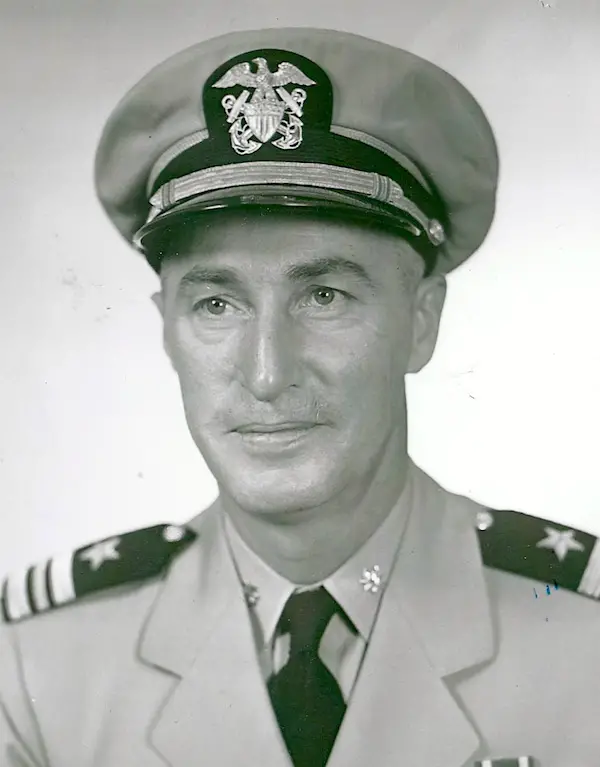Veterans Day is a holiday set aside to honor those who served their country. My father was one of those veterans and a proud career member of the United States Navy. He served 30 years and would have served 30 more, the Navy and the Good Lord willing. But that was not to be.
At the remarkably young age of 48, Don “Mickey” McGuire had to retire from his beloved Navy. But he showed them: he went back to work for the Navy as a civilian and worked another 18 years.
His story is no more remarkable than that of hundreds, indeed thousands of other military veterans, but I often reflect on his service to the country and the Navy, and the sacrifices he and my Navy wife/mother made throughout their married lives. They have been my inspiration and my heroes throughout my life. They spawned another generation of public servants in their three daughters.
Mickey lied about his age to join the Navy. While lying about his age may not have been an auspicious beginning for what turned out to be a distinguished Naval career, it certainly was an enthusiastic one. I recall him telling me his main motivation for joining the military was the Great Depression. His parents had eleven children to feed and my grandfather, who worked for the railroad and farmed part-time, was having trouble doing it. My dad thought it would be best if he became self-supporting and took one of those mouths away from the table, so he visited the Naval recruiting office in his small hometown in Pennsylvania’s railroad country.
But once he got the salt air into his lungs and the feel of a ship under his feet, he was hooked. When he finished boot camp, he was enlisted as a Seaman Apprentice, the lowest rank in the Navy in 1933. With no college education and only the specialty training the Navy offered him, he rose in rank over that 30-year career to a Lieutenant Commander.
His last duty assignment was as Commanding Officer of a small research station on the coast of Washington. I later came to understand that this post was usually held by someone with the rank of Commander, and was a reward for his key role in launching a super-secret anti-submarine warfare project.
World War II
My Alabama-bred mother and my Pennsylvania-bred father met and married in Philadelphia on December 7, 1940. Betty and Mickey were home celebrating their first wedding anniversary when they heard on the radio the news about Pearl Harbor.
The war they had known would come—the war the US Navy was already petty much in the middle of—was here and would change their lives. When Mickey was assigned to a “Q Boat” out of Boston, Betty went up there to be with him when he came back after weeks at sea.
The duty was dangerous. A small Navy contingent hid below decks on a vessel disguised as a civilian fishing boat in order to monitor enemy shipping in the Atlantic. He told me that had they been caught, they would not have been protected by international law and could have been summarily executed.
He also told of one time when they were the first on the scene of a US vessel sunk by a German U Boat. He and his crewmates worked hours to pull frozen bodies from the ocean, for once not worrying about getting caught out in the open. He said he lived with that awful image his entire life.
During the war my dad served in the Atlantic and the Pacific, racking up decorations for service and being commissioned as an officer in 1943 shortly after his 10-year service anniversary. Meanwhile, my parents brought my two older sisters into the world, one in 1942 while stationed in Boston, and the other in 1944.
My dad was at sea for long periods of time while my mother lived with her brother and his family and had two babies to care for while working a full-time job at one of the factories supporting the war effort.
I have often marveled at the sheer grit and relentless optimism that led these two people to start a family under these circumstances. The challenges my husband and I faced as parents pale in comparison. We never had to put our baby in a dresser drawer instead of a crib, go without milk for our child, take him screaming to the bomb shelters, or worry about whether our spouse was going to make it back from the war alive.
Post WWII Era
Life after the war was good.
Both of my parents relished the Navy life and shore duty that followed the war. By the time I came along, my dad was mostly stationed at bases and not on ships.
But the Korean War came along and once again Mickey set sail to serve in that war zone. Again, my mother was on her own for a few years—this time with three young children.
My folks never once considered giving up the Navy. It was a calling for both of them. Corny as it may sound, he was serving the country he loved in a uniform he cherished. They assured me often that the rewards made the sacrifices seem small.
It was a really rough challenge when he had to retire from the Navy and they both had to adjust to civilian life. Mickey found his niche and Betty eventually came to terms with it, but the transition was a difficult one for them. It was made even more difficult by their now empty nest, but they dealt with it just like they had dealt with so many challenges before.
Today is Veterans Day, a special day set aside to honor Mickey and so many others just like him. Join me in saying “thanks” to all of our parents’ generation for their amazing sacrifices and service.



